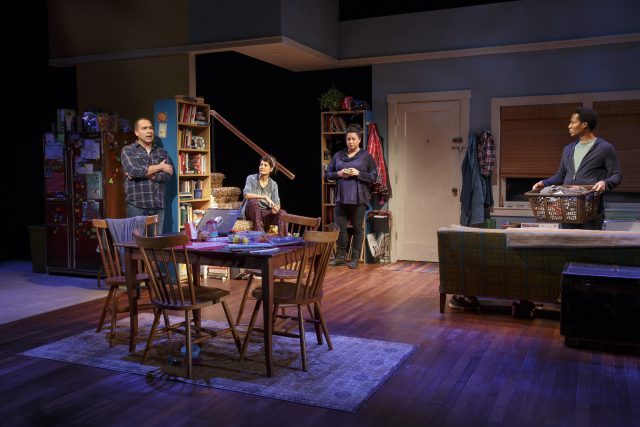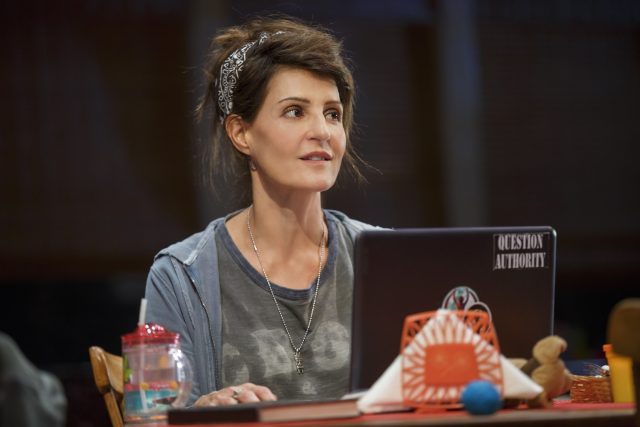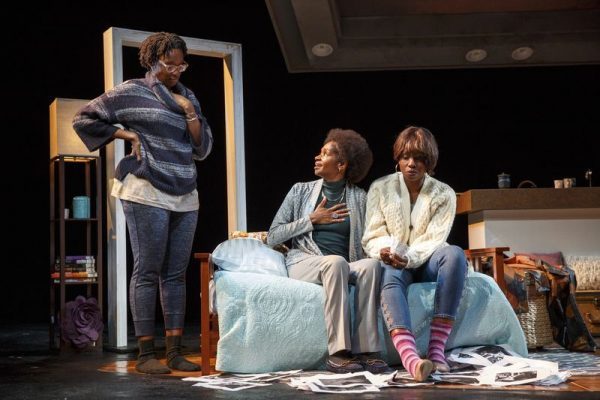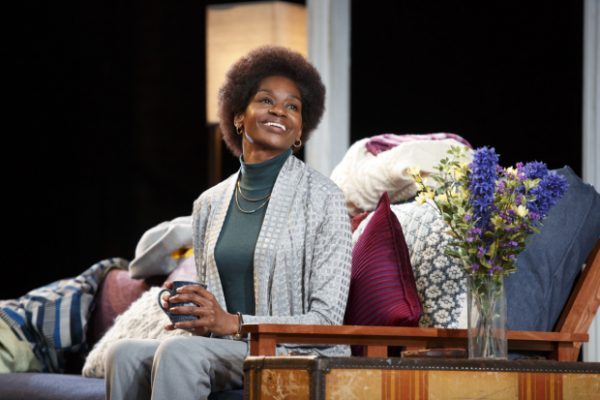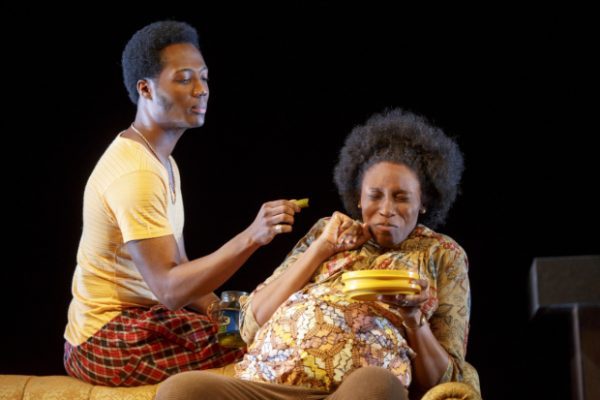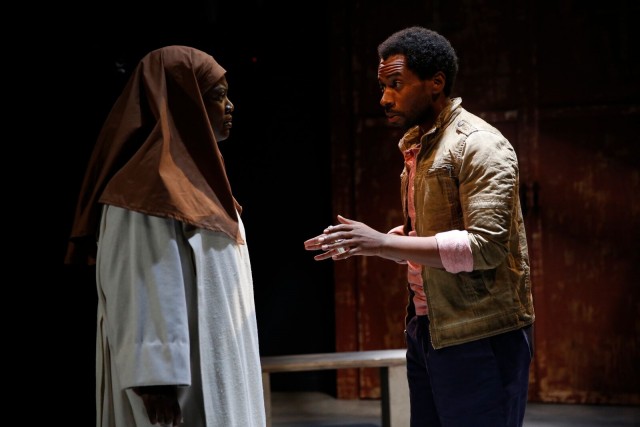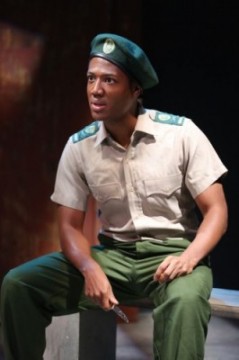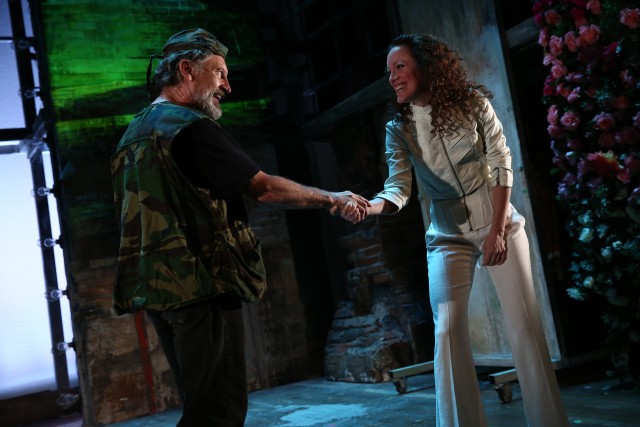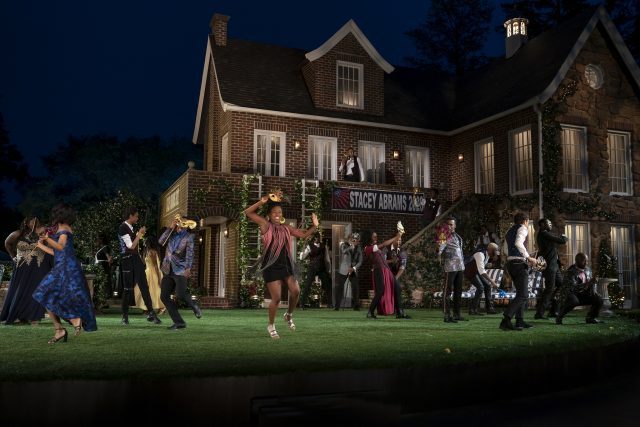
Kenny Leon moves Much Ado About Nothing to modern-day Atlanta in Shakespeare in the Park adaptation (photo by Joan Marcus)
Central Park
Delacorte Theater
Tuesday – Sunday through June 22, free, 8:00
shakespeareinthepark.org
Danielle Brooks gives a powerhouse comedic performance as Beatrice in Kenny Leon’s jaunty, rollicking adaptation of William Shakespeare’s ever-charming romantic comedy Much Ado About Nothing, which opened Tuesday night at the Public’s open-air Delacorte Theater in Central Park, where it continues through June 22. Leon has moved the proceedings to modern-day Atlanta, complete with cell phones, contemporary music, and an impressive car that pulls up at the back of Beowulf Boritt’s welcoming set — the large, grassy courtyard and four-story estate belonging to Gov. Leonato (Chuck Cooper), boasting a pair of red, white, and blue political banners declaring, “Abrams 2020,” referring to former Georgia gubernatorial candidate Stacey Abrams (who recently was in the audience). The show opens with Beatrice singing Marvin Gaye’s “What’s Going On,” soon joined by Leonato’s daughter, Hero (Margaret Odette), and her ladies-in-waiting, Ursula (Tiffany Denise Hobbs) and Margaret (Olivia Washington), singing “America the Beautiful,” a stark contrast highlighting the polarized state of our nation as the songs overlap. Following a brief protest march with signs condemning hate, the dapper Don Pedro (Billy Eugene Jones) arrives with his contingent after a military victory, including his close friend Count Claudio (Jeremie Harris), his guitar-strumming attendant, Balthasar (Daniel Croix Henderson), and the don’s brother, the bastard Don John (Hubert Point-Du Jour).
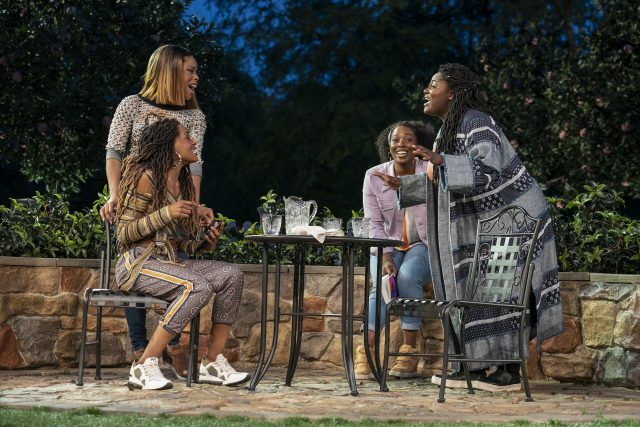
Beatrice (Danielle Brooks) gossips with her besties in Much Ado About Nothing in Central Park (photo by Joan Marcus)
Claudio immediately falls for Hero while Beatrice, Leonato’s niece, and Benedick (Grantham Coleman), a lord who fought alongside Don Pedro, throw sharp barbs at each other, neither in the market for a spouse. (The first time Beatrice says his name, she emphasizes the last syllable.) But Don John, who is no Don Juan, has decided that since he is miserable, no one else is to be happy, so he calls upon his henchmen, Borachio (Jaime Lincoln Smith) and Conrade (Khiry Walker), to stir up trouble and cast would-be lovers against one another. “I had rather be a canker in a hedge than a rose in his grace,” Don Pedro says. “Though I cannot be said to be a flattering honest man, it must not be denied but I am a plain-dealing villain. I am trusted with a muzzle and enfranchised with a clog; therefore I have decreed not to sing in my cage. If I had my mouth, I would bite; if I had my liberty, I would do my liking. In the meantime, let me be that I am, and seek not to alter me.” Mistaken identity, misunderstandings, a masquerade ball, spying, lying, and private letters all come into play in one of the Bard’s most beloved comedies.
Tony nominee Brooks (The Color Purple, Orange Is the New Black) is phenomenal as Beatrice, taking full advantage of her size, her vocal talents, and her expert timing. She moves and grooves across the stage, reciting her lines with an easygoing, conversational flow and rhythm, an innate sense of humor, and a magical command of the language that breathes new life into the Bard’s words. “I pray you, how many hath he killed and eaten in these wars? But how many hath he killed? For indeed I promised to eat all of his killing,” she proclaims early on. It’s all Coleman (Buzzer) can do to not get swept up in the hurricane that is Brooks; on the rainy night I went, he even took a hard spill on the wet ground, wiping out on his back but getting up quickly, able to joke about the nasty fall. (It reminded me of a special moment I saw in the previous Shakespeare in the Park production of the play five years ago, when John Glover, as Leonato, pulled off an unforgettable, far less dangerous maneuver after a storm.)
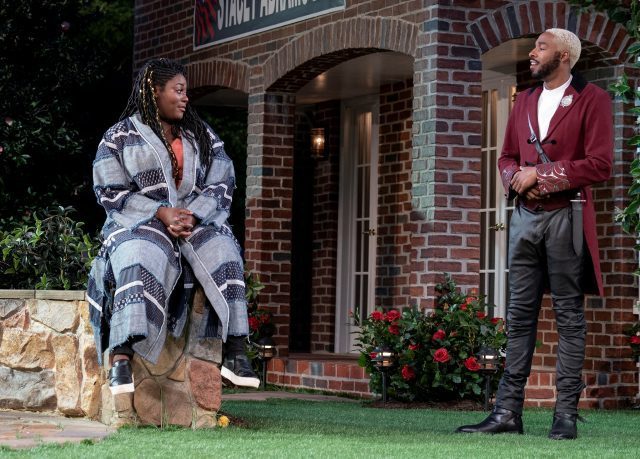
Beatrice (Danielle Brooks) and Benedick (Grantham Coleman) explore a love-hate relationship in Bard romantic comedy (photo by Joan Marcus)
Tony winner and longtime Atlanta resident Leon (American Son, A Raisin in the Sun) has the women take charge in this version, the men relegated to the back seat in the all-person-of-color cast. He even has a woman, Lateefah Holder, portray Constable Dogberry, although her shtick becomes too repetitive (but is very funny at first). Among the males, the always dependable Cooper (Choir Boy, The Piano Lesson) stands out, steady and forthright, while Odette (The Convent, Sign Me) is a sweetly innocent Hero. The fresh choreography is by Camille A. Brown, with snappy costumes by Emilio Sosa and original music by Jason Michael Webb. But at the center of it all is Brooks, who is in full command as a Beatrice for the ages.
(In addition to waiting on line at the Delacorte and the Public to get free tickets, you can also enter the daily virtual ticketing lottery online here. The play is almost never canceled because of bad weather, so going on a rainy day is a great idea, as a lot of seats become available due to no-shows.)
